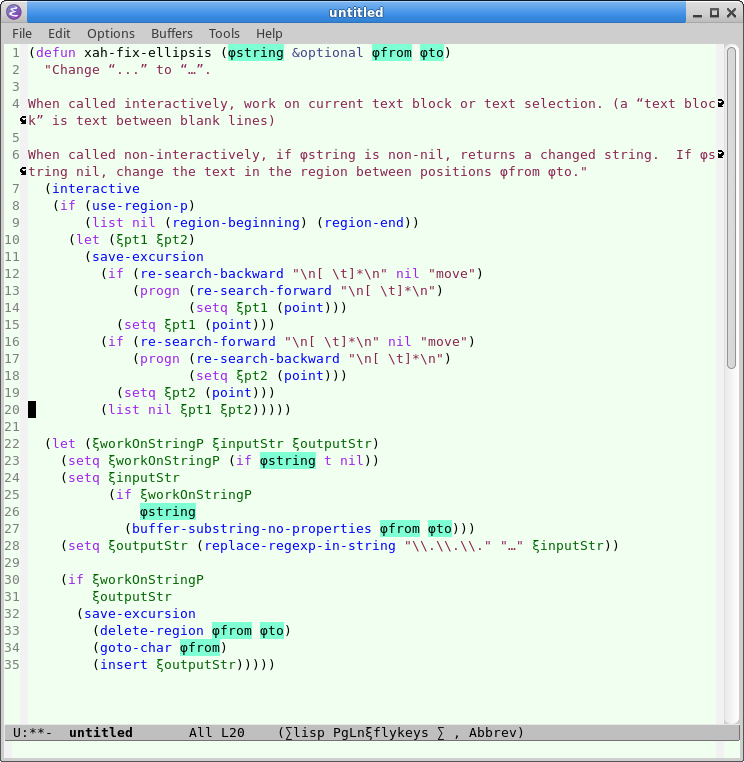Function Parameter names start with phi φ, variable names start with xi ξ (2014)
new crotchet: all function parameter names should start with φ and all local variable names should start with ξ .

Example in JavaScript:
function draw_rect (φx_coord, φy_coord, φwidth, φheight) { // returns a svg rect element var rect = document.createElementNS("http://www.w3.org/2000/svg", "rect"); rect.setAttribute("x", φx_coord.toString()); rect.setAttribute("y", φy_coord.toString()); rect.setAttribute("width", φwidth.toString()); rect.setAttribute("height", φheight.toString()); return rect; }
〔see JavaScript Basics〕
this is experimental. I'm going to see how it goes.
why do you want to do this?
I want to be able to distinguish function parameters easily from local variables. (and, ideally, also easily distinguish GLOBAL variables. And built-in vs user-defined. And, wish every identifier is unique.) 〔see Variable Naming. English Words Considered Harmful〕
note, the choice of the character takes some consideration. You want a char that is:
- Unicode letter. (such as Greek letter), because some languages do not allow identifier to start with a char that's not a Unicode letter. (For example, Python 2. Lexical analysis — Python v3.3.3 documentation#identifiers and JavaScript. For what's a Unicode letter, see: JS: Allowed Characters in Identifier)
- Widely recognized. (For example, Chinese char would not be appropriate.)
- Visually distinct from English alphabets, regardless of font.
- Lower case and upper case can be distinguished, and also both must be visually distinct from any lower case or upper case English alphabets. (For example, greek ε and its capital Ε would be bad.)
note: sigil is mostly popularly associated with perl. But it's also used in PHP and Ruby, as these 2 languages directly borrowed it from Perl. (perl borrowed it from unix shell.) 〔see Perl Tutorial〕 〔see PHP Tutorial〕 〔see Ruby Tutorial〕
The idea of sigil is however quite widespread. Many languages have special chars as starting or ending variable names to indicate special purpose, though, mostly as a convention only, not part of the language machinery.
For example:
- Python class names always start with CapitalLetter. This is by convention.
- OCaml variable must start with lower case.
- In many languages, by convention, variable start with _ means it's not used.
- In many languages, by convention, variable start with double _ means it's internal.
- Mathematica builtin names start with Capital case.
- Mathematica variables starting with
$are predefined global special variables. (see: http://reference.wolfram.com/mathematica/tutorial/GlobalSystemInformation.html), since 1988.
the name sigil is coined by Philip Gwyn in 1999 to refer to perl's sigil, according to Wikipedia.
- Programing Language: Emoji and Math Symbols in Function Name, Variable, Operator
- Programing Language: ASCII Char Jam vs Unicode (2011)
- Semantic of Symbols: HTML Entities, Ampersand, Unicode
- Syntax Design: Unicode Matching Brackets as Delimiters
- Syntax Semantics Design: Use of Unicode Ellipsis Symbol vs Dot Dot Dot
- URL Percent Encoding and Unicode (2010)
- Unicode Semantics: the Ɐ in Turn A Gundam
Sigils war, special chars in variable names as syntactic type system
- Variable Naming. English Words Considered Harmful
- The Sigil War, Syntactic Indicator for Types of Function and Variable (2016)
- Function Parameter names start with phi φ, variable names start with xi ξ (2014)
- Emacs Lisp Coding Style. DOLLAR SIGN $ and AT SIGN @ in Variable Names
- Jargon: Predicate in Programing Languages (2014)
- Syntactic Meaning of Variable (2018)
- Perl: Variable Name Prefix (aka Sigil)
- Ruby: Variable Name Conventions
- PowerShell: Variable
- Clojure: Variable Name Conventions (sigil. macro magic characters.)